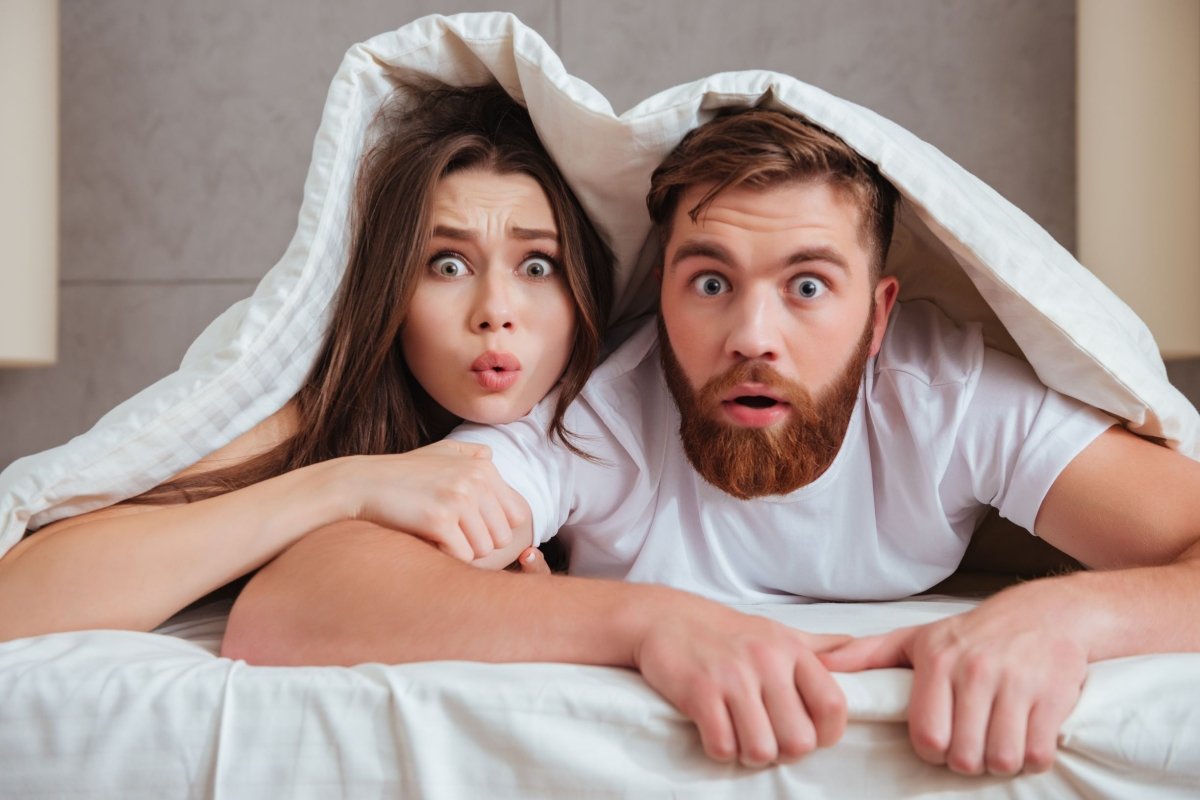Sleep and Weight Loss: All Your Questions Answered
At the start of a new year or new season, many of us make serious commitments to our health and fitness goals. For some, that means starting habits that promote lasting weight loss. Eating a balanced diet and being active are important steps toward a healthy body and mind, but those aren’t the only habits you need to reassess for your weight loss journey. Sleep and weight loss are closely related. As you and your partner pursue a healthier lifestyle, it’s easy to forget how important sleep is. So, we answer common questions and tackle the debate of sleep vs. exercise for weight loss.
Quality sleep affects weight loss in several positive ways, while sleep deprivation can sabotage your goals. Put these insights into practice as a couple, so next time someone asks how you lost the weight, you can say, “Oh, I slept.”
How Does Sleep Affect Weight Loss?
You’ve got questions about sleep and weight loss. We’ve got answers—from the truth about cortisol to the ways restful sleep can even help exercising feel better. Did you know sleeping well will actually help you stick with your new healthy habits? It’s true!
1. How Does Sleep Affect Cortisol Levels?
When it comes to sleep and weight loss, cortisol is sometimes treated like a dirty word. That’s because getting enough sleep is essential for balancing this important hormone, and when your body produces too much cortisol, you can experience some very negative consequences. Cortisol is often called our “fight or flight” hormone because it is produced by the adrenal glands during high-stress moments when we need motivation and energy to act quickly. It is also responsible for reducing inflammation, raising blood sugar, regulating blood pressure and keeping our waking and sleeping cycles on schedule.
On the other hand, lack of sleep tells your adrenal glands to produce extra cortisol, which leads to rapid weight gain and raises your risk of high blood pressure. When your body is producing the right amount of cortisol in moments when you really need it, you’re able to deal with life’s curveballs and reduce fluctuations in your weight. That’s a win, win.
2. What If I Don’t Have Enough Energy to Exercise?
Sleep helps you and your partner exercise, and exercise helps you and your partner sleep. Restful sleep, free of tossing and turning, will help you wake up refreshed and ready to take on the world, including a rigorous workout. As you sleep, your body restores and conserves energy. That’s one of the top reasons it feels so good to finally turn in at the end of the day. Having consistent energy is essential to following through with your exercise goals. Plus, according to experts at Johns Hopkins Medicine, as you exercise more, you’ll be able to sleep more soundly. There’s no need for a sleep vs. exercise face-off—they actually work together to improve many areas of your health.
3. Does Sleep Help Strength Training?
Sleep is essential to effective strength training. Your body produces the majority of growth hormone (GH) while you sleep. What does growth hormone do? Well, besides literally helping you grow through many stages of your childhood, GH also strengthens bones and rebuilds your muscles after you exercise. When you exercise, you’re actually wearing your body down and creating micro tears in the muscles. It’s the act of recovery from this process that builds the muscles up. Without recovery, you’re doing your body more harm than good, and proper recovery happens during sleep. Increasing lean muscle mass, in turn, helps you burn more fat than if you just completed cardio workouts without a strength-building element.
4. Can Sleep Help Me Achieve Weight Loss Goals?
Losing weight and improving your health isn’t just physical. It’s mental and emotional, too. Getting a good night’s sleep can help you stick to your weight loss goals, and other goals, because sleep improves focus and helps you develop your attention span. Whether you’re trying to stick with it through your morning workout or looking ahead to long-term lifestyle changes, the better sleep you get, the more equipped you’ll be to take on difficult goals. You’ll also be able to keep your eyes on results rather than getting overwhelmed by the hard work you’re doing to achieve them.
How Can Sleep Deprivation Sabotage Weight Loss?
There are few things more frustrating than trying to sift through mountains of conflicting weight loss advice, except perhaps putting the advice into action and seeing no results. So, the next three questions are about the ways sleep deprivation can put a wrench in your path to weight loss. The more you know about sleep and weight loss, the more you can avoid these common pitfalls.
5. How Does Sleep Deprivation Affect Healthy Eating?
The body’s sensations, including hunger and satiety, are managed by several hormones. These hormones are regulated by a small portion of the brain known as the hypothalamus, which also plays a crucial role in the sleep/wake cycle and other important functions. Sleep deprivation can lead the hypothalamus to produce important hormones, including cortisol, in the wrong amounts and at the wrong times. Here’s what you need to know about how these hormones relate to sleep and weight loss.
- Cortisol: Increased cortisol increases our appetite and enhances fat storage. As a result, we feel hungrier even if we don’t need to eat, and our body is more likely to retain fat cells—that’s a lose, lose. In addition, increased cortisol keeps you up at night with anxious energy (remember “fight or flight”), and the lack of sleep increases your cortisol.
- Serotonin: This powerful neurotransmitter curbs cravings and shuts off appetite, making you feel satisfied before your stomach gets too full. A study from the journal Sleep found that not getting enough sleep gradually desensitizes serotonin receptors. It turns out, when we’re low on serotonin, we tend to crave the foods that offer instant energy and satisfaction: sugars.
- Leptin and Ghrelin: Think of these two hormones as a yin and yang of hunger indication. Ghrelin stimulates hunger when your body is low on energy, and leptin shuts your appetite off once your hunger has been satiated. Research shows that people who habitually don’t get enough sleep at night have reduced leptin, elevated ghrelin and an increased body mass index (BMI).
6. What Does Poor Sleep Quality Have to Do with Insulin?
Lack of sleep doesn’t just throw off our hormone balance. It can even make it harder for our bodies to respond to hormones, too. When your body is sleep deprived, it suffers from “metabolic grogginess,” a term coined by University of Chicago researchers who analyzed the effects of poor sleep on people over four days. They found that during that time, the human body’s ability to properly use insulin became completely disrupted, and insulin sensitivity dropped by more than 30 percent. How does sleep affect weight loss in this instance? Just four days without quality sleep alters the body’s ability to use glucose—a major energy source—which can raise your risk of type 2 diabetes and increase weight gain.
7. What If Exercising Hurts?
As with all significant lifestyle changes, talk to your doctor as you consider incorporating weight loss into your routine. If you experience significant pain when you practice physical activities, your doctor can suggest ways to modify your exercise plan. Together, you may find that you’re especially perceptive to pain because you’re not getting enough sleep. Research has shown that after even one sleepless night, sleep deprivation raises the body’s perception of pain while lowering the tolerance of it. Just think what that must be like for people who sleep on a mattress that makes them toss and turn every single night. The normal aches and soreness that come with working out will be more painful and harder to handle.
How Do We Balance Sleep and Exercise?
You might be thinking, “OK, we need to eat more fruits and veggies, exercise more and get plenty of sleep. But how do we do that and set aside time for our relationship?” We hear you. There’s an entire industry trying to sell products and routines for fast weight loss results, but they aren’t all based on sound medical research. And what’s more, many fast results don’t last, because they aren’t sustainable—or enjoyable—for modern couples.
You need lifestyle changes and healthy solutions that you can practice together on a daily basis, and sleeping is one of them. If you and/or your partner are struggling to sleep at night, it’s time to turn your room into a restful sleep environment and tackle some of the causes of your insomnia. Start sleeping better with the best mattress for active couples. Our Refresh mattress features a plush memory foam sleep surface to cushion post-workout pressure points. You and your partner can adjust the support levels independently and experience its Custom Comfort™ Technology as your bodies change throughout your weight loss journey.
It’s not an easy path, but you deserve to feel healthy and happy for years to come. Let isense be your cheerleader and a resource for great sleep every night, for every body.














